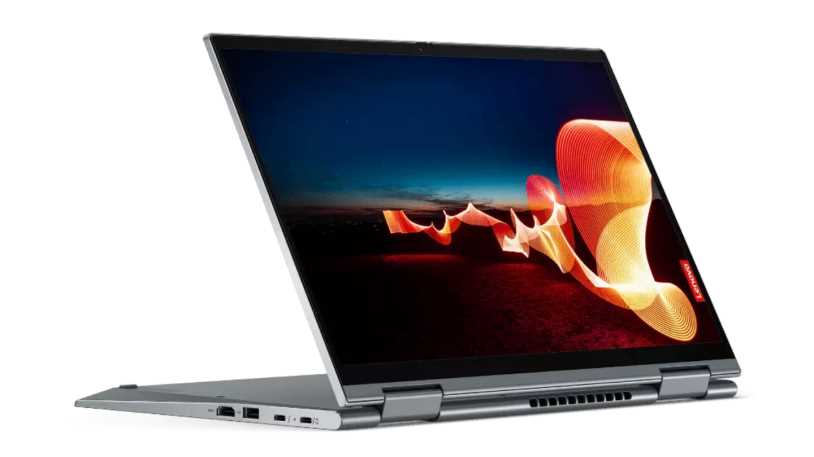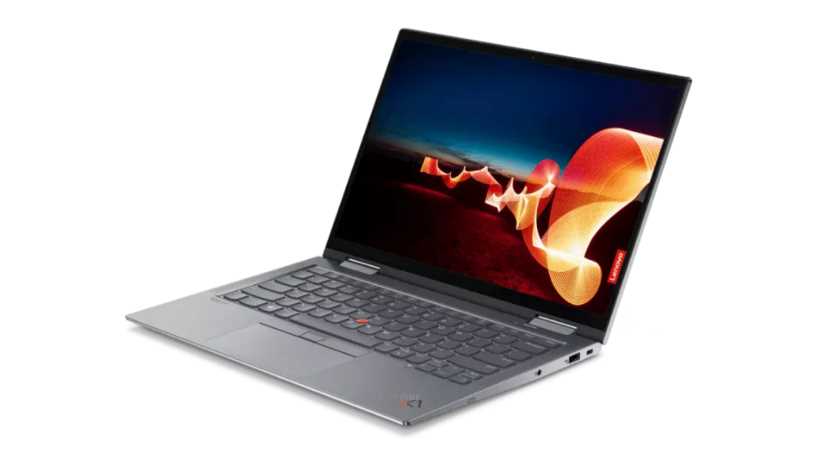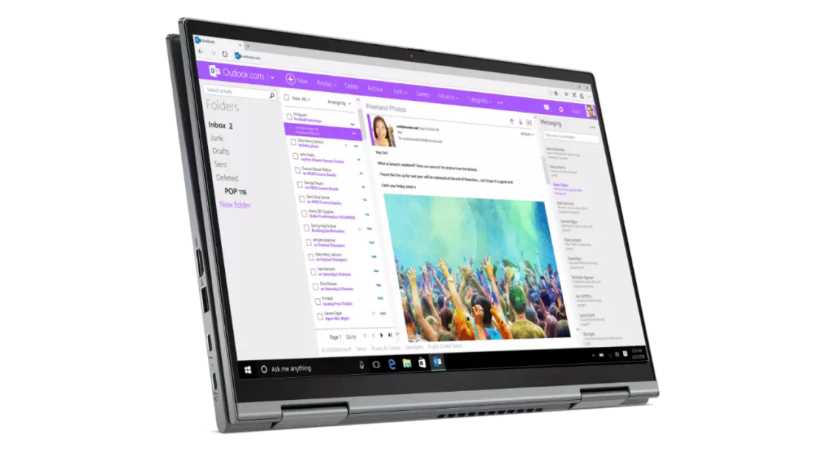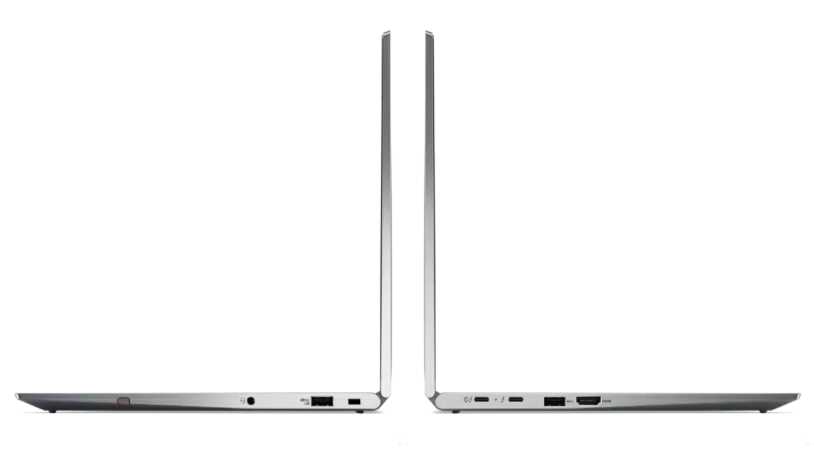* ThatSoftwareDude.com is a participant in the Amazon Services LLC Associates Program, an affiliate advertising program designed to provide a means for sites to earn advertising fees by advertising and linking to Amazon.com. It really does help keep the servers running!
I recently decided to upgrade my daily laptop to something with a bit more power. While I am a huge fan of the Surface Pro line of laptop/tablet hybrids, which I have written about extensively throughout the years, they don't come without their shortcomings. A few being the lack of total ports and the slightly below average battery life. You can check out my full Surface Pro 7 review right over here.

Lenovo
This time around though I went with something completely different. I've been a silent fan of Lenovo laptops for a couple of years now, mainly because of their fantastic keyboards and overall strong performance. Particularly the ThinkPad X1 line, which brings with it portability, security and military grade standards in a small form-factor.
And because I'm a huge fan of digital note taking, I decided to go with
the ThinkPad X1 Yoga Gen 6, which comes with a touchscreen and an
embedded pen housed directly on the case. It can also fold completely flat, hence the Yoga name. It's been my daily driver in
terms of programming for some time now and overall I am happy to say
that it is an impressive machine.
But it's pricey, usually coming in over $1600 and ranging all the way up to $2999 depending on the configuration. However, it does tend to go on sale very often and the price drops are hard to ignore. I personally picked one up during one of these sales at a fantastic discount.
So let's get into it and break down just how this small powerhouse keeps up with the day to day demands of a programmer.
What's there to like
Most of what there to like to about the Lenovo ThinkPad X1 Yoga, has to do with the ThinkPad X1 line itself. Because all X1 laptops pretty much come equipped with MIL-Spec backed durability and the latest Intel chipsets which can be configured to your needs.
In particular though, the X1 Yoga features a matte touchscreen display which keeps fingerprints away and which looks fantastic in any light setting. There is little to no glare or reflection and bezels are kept relatively thin. The smart pen is housed directly in the unit and simultaneously stays charged while being docked.
The multiple configurations of the X1 Yoga keep it flexible enough that you can use it in a variety of settings, from having a typical work day, to watching a movie in pyramid mode, to taking notes in flat mode. I personally have kept it in laptop mode pretty much 100% of the time, as it does way better as a laptop than it does a tablet.
The X1 Yoga also feels like a very premium device. There is little to no plastic to be seen on the entire unit, and yet it still manages to come in at under 3lbs.
And there are more than enough ports to keep up with your demands, which is one of the main issues that I faced when using the Surface Pro line.
And lastly, it charges impressively fast through USB-C getting almost to 100% in under 1-hour. So plenty to like overall.
Performance
The best part about the Lenovo line of laptops is that they pretty much offer almost any configuration of hardware specs that you could want or need.
If you're looking for mid-tier specs with adequate storage, then you can pick up a configuration with an Intel i5 processor and 8GB of RAM with a 256GB hard drive and save a few bucks. Or you can dial it up and go with an next-gen i7 processor with 32GB of RAM and a full 1TB of storage. If your wallet is up for it, the choice is yours.
Don't like the FHD display? Then upgrade to a QFHD display with a smudge-proof coating for a few bucks more.
All this to say that performance with the Lenovo ThinkPad X1 line is really up to you. I personally favor battery life over having a super high resolution display or the highest end chipsets. And based on my overall workload, around 16GB of RAM is plenty for my day to day work.
My current configuration features an 11th Gen Intel i5 processor which so far has kept up just fine with my day to day tasks. And it can also handle my personal gaming needs as well, to some extent.
And because the 11th gen Intel chipsets are also Intel Evo chips, you get several added benefits to performance as well, such as:
- Improved battery life
- Fast charging
- Faster wake up time
- Faster internet and image/video editing
In a sense, it's just faster.
In my personal tests, I can run several IDE's, various database management tools, design applications and multiple browsers all at the same time without any noticeable degradation in performance.
And after a few months of daily use, I have yet to see any degradation in performance.
Display

Lenovo
There are various configurations when it comes to display on the ThinkPad X1 Yoga. My personal choice was the FHD+ matte display with an anti-smudge coating, which on the Yoga model comes equipped as a touchscreen. This particular configuration comes with a 16:10 aspect ratio, which is a very nice addition to the series as it makes the whole display feel much more spacious.
The overall display is plenty bright for indoor and some outdoor usage as well coming in at around 400 nits. The matte display is really the standout feature here, especially if you're coming from a glass screen as I was. The total lack of glare with a relatively bright 16:10 display on a 14 inch screen is fantastic to work on.
The touch screen overall is decent. But when compared to something like the Surface Pro 8 there is a noticeable lack in both latency and pressure sensitivity. Not enough to make for an unpleasant scenario. Though for your basic day to day note taking, it does a great job.
If your focus is on the display however, then Lenovo also offers a 4k display as an option for an added cost. Though I have not tested out this configuration, I can assume that it will decrease the overall battery life to some extent.
Design

Lenovo
The ThinkPad X1 laptops are known for their higher quality construction and overall small form-factors. And the X1 Yoga is no different, coming in at around 2.8lb's and solidly constructed out of CNC milled aluminum.
The X1 Yoga is as sturdy as they come. Lenovo tests it's ThinkPad line against MIL-spec 810 G standards, meaning that it can withstand extreme heats, extreme colds, sand, shocks and everything else in between.
As I mainly plan on using it in an office setting, needless to say it should last me a fair amount of time.
Overall, it just feels like a very premium device. And the added red accents scattered throughout the device, such as the glowing red dot on the back of the case, and the X1 branding on the front only add to its personality.
The standout feature of the ThinkPad X1 Yoga design though is its 360 degree hinge mechanism that can quickly convert the laptop to a tablet sized form-factor and anything in between.
Though, due to its larger size when compared to an actual tablet, holding the Yoga X1 in tablet mode for extended periods of time might before somewhat uncomfortable.
Keyboard
The ThinkPad X1 Yoga comes equipped with a full-sized backlit keyboard with the now infamous red button, also known as the Trackpoint, which can be used for various context dependent features.
There is nothing particularly standoutish about the keyboard, but in Lenovo's case, that's a good thing. Because Lenovo's keyboards are widely revered in the business world as some of the best in terms of tactile feel and overall usability.
And as a programmer, who sometimes goes on typing sessions of 30+ minutes, I can attest that the keyboard is definitely at the top of the list.
Overall my accuracy is consistently higher on the Lenovo ThinkPad than with any other keyboard that I have used.
The only downside is with the actual layout, as the Ctrl and function keys are swapped from their more traditional locations, which does take a while to get used to.
But Lenovo has a setting specifically designed to swap the alt and Ctrl key back to their normal position.
Battery life
For me personally, battery life is near the top of the list when it comes to features on a laptop. And that's because I tend to take my laptop pretty much everywhere, from my office, to my home to a coffee shop or to a meeting. And knowing that I can at least have a few hours of wireless work is important.
The ThinkPad X1 Yoga has vastly improved its overall battery life when compared to it's previous iterations. The overall estimates that you will find online from various testing sites puts the X1 Yoga at around the 12-14 hour mark in terms of active unplugged time.
From my personal tests, this is pretty spot on. And while there are currently laptops on the market that bring with them 20+ hours of battery life, a 12-14 hour window will easily buy you an entire workday completely unplugged, which is still impressive.
Lenovo's use of Intel Evo chips on the Yoga Gen 6 is one of the reasons for this overall boost in battery life.
Also note that total battery life will also be dependent on the exact configuration, as improving the display and using a more power hungry CPU will decrease the overall on time.
During my more intensive work days however, when I have multiple IDE's running and a background video playing non-stop, my battery life falls down to the 5-6 hour range, which is pretty expected.
Ports

Lenovo
One of the biggest reasons why I decided to upgrade my current development laptop was mainly because my previous daily driver, the Surface Pro 6, only comes with 2 ports. And only one of those ports is a USB-A port. And that's mainly because the Surface Pro line is still marketed as a tablet and not a full business laptop.
The one port is great when in use, but I have to selectively decide which device will get to be plugged in that day.
The ThinkPad X1 line however, is a legitimate marketed laptop meaning that it doesn't have to abide by tablet rules. And it comes fully equipped with ports of all kinds and in multiple quantities.
On one side you have 2 Thunderbolt 4 USB-C ports, which can be used both for data and power, 1 USB 3.2 Gen 1 port, 1 HDMI port and a 3.5 audio jack and a 2nd USB-A port on the other side. Definitely enough to handle your daily workload.
Security
As a programmer who works with multiple clients of all kinds, security is definitely near the top of the list when it comes to features that I am looking for. I need to keep my clients data secure, as well as my own.
The ThinkPad X1 Yoga comes equipped with a MoC (Match on Chip) fingerprint sensor built into the power button and can also be configured to use Windows Hello for authentication as an added option.
As is standard with ThinkPads, it also comes with a built-in front-camera shutter and a dTPM 2.0 chip which encrypts user data on the device.
It's widely known that Lenovo focuses heavily on security in all of their laptops and it is no different here with the ThinkPad X1 Yoga.
Downsides
The ThinkPad X1 Yoga isn't perfect, though it is a vast improvement over it's predecessors. One of the biggest downsides is the fact that the RAM is soldered onto the device, meaning that you won't be able to upgrade it once you have made your purchasing choice.
And seeing as how one of the options is an 8GB RAM model, I'd heavily consider going for the 16GB at the extra cost. The last thing that you want to do is to fire up your daily workload, only to max out your RAM within the first few seconds of boot up.
It's also a bit on the expensive side when compared to similarly specd laptops, though that cost can be justified when looking at the overall high-quality build. But you can probably find a laptop with similar specs for several hundred dollars less, though you might see more plastic parts overall.
In Conclusion
As this is my first Lenovo ThinkPad laptop, I was a bit nervous when making the final purchasing decision. After daily use and taking it through the ringer however, I can say that the X1 Yoga has definitely lived up to my expectations.
It's an all-day battery laptop with overall great performance and I personally think that it definitely looks like a premium device. Add to the fact that it is MIL-Spec tested to withstand extreme conditions and that it brings with it one of the best keyboards on the market, and this one is an easy recommendation on my end.